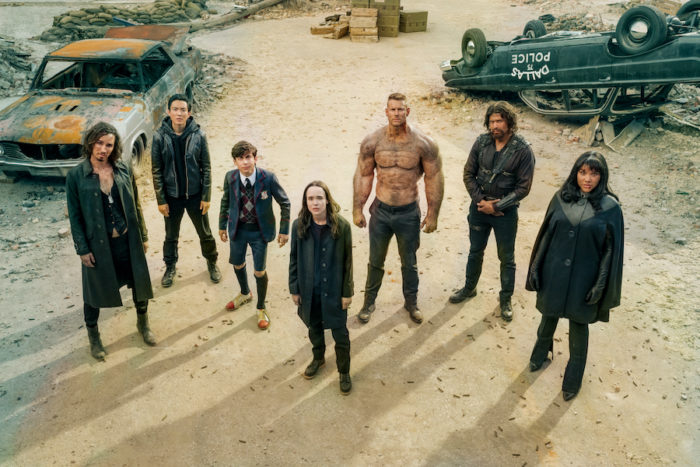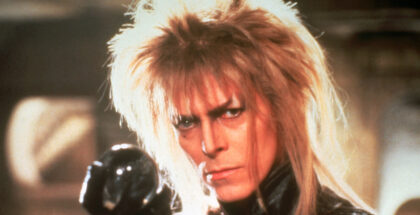The Umbrella Academy Season 2: A confident step up
Review Overview
Surface
8Depth
6Fun
8David Farnor | On 31, Jul 2020
Warning: This contains spoilers for Season 1 of The Umbrella Academy. Not caught up? Read our spoiler-free review here.
“What the hell did we do now?” That’s the sound of The Umbrella Academy returning for Season 2, just in time to stop the apocalypse. Again.
That sense of deja vu is all too apt for this self-aware adaptation of Gerard Way and Gabriel Ba’s comic books, which has never met a pop culture reference it didn’t like, including itself. The show, for the uninitiated, follows seven kids who were adopted by a billionaire after they were all born at the same time on the same day and began to display special abilities. Having drifted apart, Season 1 brought that back together to solve the mystery of their father’s death and prevent the end of the world. Season 2 scatters them all over the place – and time – and once again gradually reunites them. But where the first time we watched that happen, things felt bitty and hyperactive, the second time’s the charm: The Umbrella Academy has found its groove for Season 2, and it’s a riff that’s never less than catchy.
Luther (Tom Hopper) remains the ostensible leader of the “Academy”, thanks to his gigantic, hairy arms and muscles – the opposite of Klaus (Robert Sheehan), whose gift to talk to the dead has led him to a lifetime of irresponsible debauchery. In between them are knife-wielding Diego (David Castañeda) and Allison (Emmy Raver-Lampman), whose ability to spread rumours that come true make her a persuasive force not to reckon with. And, the outcast of the bunch, Vanya (Elliot Page), who was raised to believe she was powerless. (Spoiler: She wasn’t, and almost turned into the Big Bad of Season 1 as she slowly discovered that fact.)
Scattering them every which way is Five (Aidan Gallagher), who has the ability to travel through time – and, after using his powers to avoid the apocalypse, only ends up brining about another one. We pick up as Five arrives in 1960, where a nuclear war is in full swing, and the rest in adjacent years all within the Dallas area – a timeline that leads up to the assassination of JFK. Quicker than you can say “11/22/63”, we’ve hopped back and forth between each character’s story, as they find ways to survive and insert themselves into their new surroundings while waiting for someone familiar to find them. Luther does it through bare-knuckle barfights, Diego spends his time in an asylum, while Klaus has become some kind of cult leader.
Sheehan’s gloriously silly performance is one of the show’s standout elements, as he embraces the dark humour of his circumstances with enough energy to balance the pathos of Luther’s more downbeat presence. Vanya, meanwhile, has forgotten everything and built a new life on a farm – a frustrating step back for Elliot Page’s engagingly forthright outsider, as she once again has to discover who she is. But holding it together is Gallagher’s excellent turn as Five, a 50-year-old man in a schoolboy’s body who manages to convey weariness, authority, excitement and surprise all while wearing a natty blazer.
The weaker elements involve Allison, who has become a civil rights figure and earnestly campaigns for racial equality – not because of Lampman’s performance but because The Umbrella Academy’s madcap tone and frenzied bursts of action don’t exactly lend themselves to thoughtful explorations of racism and American identity. Hot on the heels of HBO’s Watchmen, Allison’s scenes are well-intentioned but highlight the shallow nature of Netflix’s comic book show – one that places an emphasis on the words “graphic” and “novel”.
Yet when it comes to shallow thrills, The Umbrella Academy is hard to beat, and Season 2 sees the show step up its confidence as well as its pace. The set pieces are bold, inventive and always soundtracked to an ironic pop song. When Five pops in and out of fisticuffs with Swedish assassins, it’s a joy to watch the zany action sequences unfold, with dynamic camerawork and just enough mysterious plot mechanics to make it all seem substantial. The result is a world where people can have fishbowls for heads, where people flippantly refer to a “cousin on my robotic mother’s side” with a straight face. Served with an over-the-top attitude and a brash ambition, its a smorgasbord of ideas from other sci-fi and fantasy stories, stitched together with dialogue that’s either on-the-nose or bang on-the-button. It’s too much and simultaneously not enough – a combination that, either way, leaves you wanting more.
The Umbrella Academy is available on Netflix UK, as part of an £9.99 monthly subscription.




















